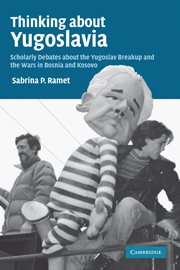 Thinking about Yugoslavia
Thinking about Yugoslavia Book contents
- Frontmatter
- Contents
- Preface
- List of books discussed
- Glossary
- 1 Debates about the war
- 2 The collapse of East European communism
- 3 The roots of the Yugoslav collapse
- 4 Who's to blame, and for what? Rival accounts of the war
- 5 Memoirs and autobiographies
- 6 The scourge of nationalism and the quest for harmony
- 7 Milošević's place in history
- 8 Dilemmas in post-Dayton Bosnia
- 9 Crisis in Kosovo/a (with Angelo Georgakis)
- 10 Debates about intervention
- 11 Lands and peoples: Bosnia, Croatia, Slovenia, Serbia
- 12 Southern republics: Macedonia and Montenegro in contemporary history
- 13 Conclusion: controversies, methodological disputes, and suggested reading
- Index
- References
1 - Debates about the war
Published online by Cambridge University Press: 22 September 2009
- Frontmatter
- Contents
- Preface
- List of books discussed
- Glossary
- 1 Debates about the war
- 2 The collapse of East European communism
- 3 The roots of the Yugoslav collapse
- 4 Who's to blame, and for what? Rival accounts of the war
- 5 Memoirs and autobiographies
- 6 The scourge of nationalism and the quest for harmony
- 7 Milošević's place in history
- 8 Dilemmas in post-Dayton Bosnia
- 9 Crisis in Kosovo/a (with Angelo Georgakis)
- 10 Debates about intervention
- 11 Lands and peoples: Bosnia, Croatia, Slovenia, Serbia
- 12 Southern republics: Macedonia and Montenegro in contemporary history
- 13 Conclusion: controversies, methodological disputes, and suggested reading
- Index
- References
Summary
The field of Yugoslav studies has long been divided. In the Tito era, much of the literature was, very roughly, divided between those who viewed Tito as ‘one of ours’ (‘Has Tito gone bourgeois? ’, a 1966 article asked) and those who took a more critical view of the Yugoslav leader. Early in the post-Tito years, the field was divided – again, roughly speaking – between those who believed that Yugoslavia had achieved a degree of stability sufficient to warrant, for example, the optimistic sentiment that, ‘while the problems confronting the post-Tito leadership are serious, they do appear to be subject to solution within the existing framework’, and those who believed that the Yugoslav socialist system ‘as it exists has begun to undergo a process of decay’ to the extent that the outlook for the survival of Yugoslavia could only be judged to be ‘rather bleak’.
More recently, the field of ‘Yugoslav’ (or, perhaps, post-Yugoslav) studies has again been divided largely between two camps (though not all works fall into one of these two camps, of course). On the one side are those who have taken a moral universalist perspective, holding that there are universal norms in international politics, that these norms are founded in Universal Reason and expressed in international covenants such as the Universal Declaration of Human Rights, and that, in recounting the horrors of the recent War of Yugoslav Succession of 1991–5, the analyst must account for the disintegration of socialist Yugoslavia and the outbreak of hostilities, identifying culpable parties.
Information
- Type
- Chapter
- Information
- Thinking about YugoslaviaScholarly Debates about the Yugoslav Breakup and the Wars in Bosnia and Kosovo, pp. 1 - 34Publisher: Cambridge University PressPrint publication year: 2005